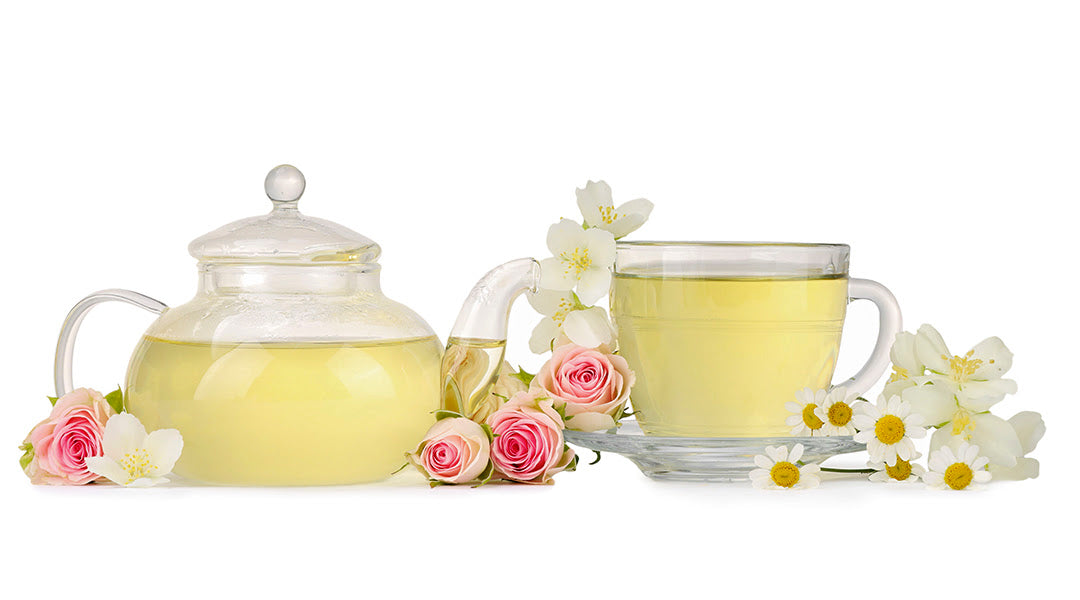
Guide to Organic White Tea: Types, Benefits, Side Effects and Brewing Techniques
Tea is the second most consumed beverage in the world after water, with over 159 million Americans drinking it daily. Among the various types of tea, white tea stands out for its delicate flavor and high levels of antioxidants.
White tea is the least processed tea and is made from young tea shoot buds and select leaves, giving it a lighter color and minimally oxidized character compared to black and green teas.
What makes white tea production unique is the emphasis on organic farming methods which avoid synthetic pesticides and fertilizers. This protects the soil, wildlife and waterways while allowing the full, natural flavor of the tea to develop.
History of White Tea
The origins of white tea can be traced back over a thousand years to the Tang Dynasty in China. During the Song Dynasty, it was an extremely rare variety reserved only for royalty. The traditional Song Dynasty preparation method involved whisking a powdered form in wide bowls, similar to the Japanese matcha tea ceremony. White tea leaves were also traditionally pressed into cake form or packed loosely into earthenware kettles for infusion.
For many years, white tea remained relatively unknown outside of China until the Ming Dynasty relaxed prohibitions, allowing more accessibility to loose leaf white tea for the public. This transition opened up trade opportunities that introduced white tea across the globe.
What is Organic White Tea?

Organic white tea must meet strict government standards to receive certification. It means no synthetic pesticides, fertilizers or other chemicals can be used in the growing and production process from start to finish. Instead, organic white tea relies on natural solutions like compost fertilizers and beneficial insects for pest control. These sustainable techniques enrich the soil and protect wildlife habitats.
From an environmental standpoint, organic production greatly reduces toxic agricultural runoff into lakes, rivers and groundwater. From a health perspective, organic teas allow our bodies to reap the full range of antioxidants, vitamins and minerals in the tea without concern over residual contamination.
Types of Organic White Tea

There are five main types of organic white tea, each with their own unique characteristics:
Silver Needle
The highest quality white tea, Silver Needle offers delicate needle-shaped buds covered in tiny white hairs, yielding a sublimely sweet floral flavor. The liquor takes on a very pale golden hue.
White Peony
This premium white tea balances two leaves with a bud for an elegant combination of light woodsy tones and nectar-like sweetness finishing with subtle nutty roasted notes. White Peony produces a shimmering golden cup.
Tribute/Noble, Long Life Eyebrow
Comprising more mature leaves that remain after higher grades are harvested; these good quality white teas have bolder flavors reminiscent of an oolong tea. The infused color in the cup tends to be noticeably darker as well.
Fujian New Craft
A more modern style of white tea, New Craft goes through an unconventional production method including slight rolling and oxidation. Long curly dark green and brown leaves yield a surprisingly mild fragrance but robust mineral taste.
Nutrition Information
While organic white tea contains no fat, carbohydrates, protein or significant vitamins and minerals, it offers an abundant array of protective plant compounds. These include:
- Catechins - Antioxidant compounds like EGCg that help prevent cell damage and chronic disease.
- Flavonoids - Anti-inflammatory agents like quercetin and kaempferol that support immune function.
- Polyphenols - Gallic acid and theogallin which demonstrate anti-cancer, cardioprotective and neuroprotective activities.
With a negligible calorie count, organic white tea is an extremely healthy beverage option for weight management and can easily be integrated into a weight loss plan. The rich supply of catechins, in particular, has natural thermogenic fat-burning properties as well.
Potential Health Benefits of Organic White Tea

Modern scientific investigation into organic white tea lends credence to many traditional claims of improved wellness.
Antioxidant Protection
The high antioxidant content helps prevent cell damage from compounds called free radicals which are linked to cancer, heart disease and accelerated aging. Key antioxidants include polyphenols, flavonoids and potent catechins.
Cardiovascular Health
Studies demonstrate white tea’s potential to promote heart health by relaxing blood vessels which reduces blood pressure. The antioxidants protect artery walls from oxidative damage that leads to plaque buildup and can cause heart attacks and stroke.
Blood Sugar Regulation
Research also suggests white tea may increase insulin sensitivity in diabetes patients and lower insulin resistance which can lead to metabolic disorder. By improving glucose uptake and preventing spikes in blood sugar, white tea helps manage diabetes.
Blood Sugar Regulation
Research also suggests white tea may increase insulin sensitivity in diabetes patients and lower insulin resistance which can lead to metabolic disorder. By improving glucose uptake and preventing spikes in blood sugar, white tea helps manage diabetes.
Anti-Cancer Activity
Additional anti-cancer effects have been shown in lab studies such as human lung cancer cell destruction and inhibition of colon cancer cell spreading by preventing angiogenesis (new blood vessel formation). The antioxidants protect healthy cells from DNA mutations that cause cancer.
Oral Health
The natural fluoride, tannins and catechins found in organic white tea may strengthen tooth enamel to help prevent cavities and plaque formation for better oral health. The compounds inhibit bacterial adhesion and destroy plaque bacteria like Streptococcus mutans.
Bone Health
Further research indicates the tea may also hinder enzyme activity responsible for breaking down bone, offering protective effects against osteoporosis over the long term. The fluoride content contributes to increased bone mineral density.
Neurological Disease Prevention
Other studies propose organic white tea might provide affirmative influences on disorders like Alzheimer’s and Parkinson's disease by inhibiting the clustering of neuron-damaging proteins in the brain. The catechins maintain cognitive function and memory centers.
Skin Health and Anti-Aging
Finally, potent antioxidants in white tea can slow down the activity of free radicals that accelerate aging internally and externally. One study showed a decrease in wrinkling and moisture retention benefits for skin after continued use of white tea by study participants.
Potential Side Effects of Organic White Tea

While organic white tea has an admirable safety profile for most people, a few precautions are warranted:
Caffeine Content
Even though white tea contains far less caffeine compared to other teas when steeped properly, sensitive individuals may still experience sleep disturbances or anxiousness.
Pregnancy and Breastfeeding
Expectant and nursing mothers should exercise caution with all teas as heavy metals like aluminum and lead can be absorbed. Organic varieties help reduce this risk.
Pre-existing Conditions
Persons living with anemia, liver disease or anxiety disorders should limit intake until consulting a physician about any potential interactions with medications or therapies.
Brewing Techniques for Organic White Tea

Proper brewing technique is vital for coaxing the most subtle flavors from organic white tea's delicate leaves while avoiding unpleasant bitterness or astringency. White tea can easily become over extracted without careful attention paid to water temperature and steep time.
Use fresh filtered or bottled still water for the cleanest flavor profile and heat only to 175°F to 185°F. Quickly prewarm the teapot or infusing vessel by swishing a little hot water inside then discarding it. Add one tablespoon of organic white tea leaves per 8 ounces of water into the warmed vessel. Allow to infuse undisturbed for 1 to 3 minutes depending on personal taste preferences. White peony or bolder fuller leaf varietals can steep slightly longer, while the most delicate silver needle buds require less time.
Pour the tea into warmed ceramic tea cups or small clear glass teapots to better admire the light golden hued liquor. Drink mindfully, allowing the sublime sweetness to captivate the senses. A second 8-ounce infusion using the same leaves is acceptable when closely monitoring an increase in bitterness but refrain from oversteeping on additional infusions which exacerbate astringency issues. Light colored leaves are best discarded after one or two careful uses to preserve optimal flavor.
Recommendations for Trying Organic White Tea
Seeking out a reputable brand ensures your first taste of organic white tea will be the very best quality. Check for signs of freshness like recent harvest dates and product turnover rate at vendors if buying loose leaf. Well-stored tea in non-porous sealed packaging helps to better preserve flavor. Consider beginning with the most popular Silver Needle or White Peony varieties to benchmark the quintessential white tea experience. Expand horizons from there as your affinity for this elegant tea grows.
Conclusion
Organic white tea offers a light, sweet elixir packed with protective antioxidants that are hand crafted to preserve optimal flavor. Its roots may trace back through Chinese dynasties but white tea’s reputation continues to soar throughout the modern world. Partake mindfully, allowing the gentle rituality of white tea brewing to calm the spirit as readily as the tea itself refreshes the body. Savor the opportunity to drink in good health, one soothing sip at a time.
FAQs
What are the most popular types of organic white tea?
The two most popular varieties are Silver Needle and White Peony, which offer the quintessential white tea experience centered on delicate, sweet flavor profiles.
Is drinking white tea safe during pregnancy?
While moderate consumption should pose no risk, pregnant women are advised to limit white tea intake due to naturally occurring heavy metals that may be harmful in excess.
Can white tea help me lose weight?
With zero calories and high antioxidant content, white tea can assist weight loss efforts. Catechins, in particular, have natural thermogenic fat-burning effects.
What health conditions could white tea improve?
Studies link white tea compounds to reduced risk for several chronic diseases including heart disease, diabetes, cancer, osteoporosis and neurological disorders like Alzheimer’s and Parkinson’s.
How should I brew white tea for the best flavor?
Use freshly boiled water at 175°F - 185°F and steep organic white tea leaves for 1 to 3 minutes to prevent bitterness and astringency from over-extraction.
Does white tea contain caffeine?
Yes, white tea contains caffeine though significantly lower levels compared to other teas when brewed properly using short steep times. Those sensitive to caffeine should exercise moderation.
Check out Lifeboost Coffee Champagne Bliss Tea.
Medical Disclaimer
This content is for informational and educational purposes only. It is not intended to provide medical advice or to take the place of such advice or treatment from a personal physician. All readers/viewers of this content are advised to consult their doctors or qualified health professionals regarding specific health questions. Neither Dr. Charles Livingston nor the publisher of this content takes responsibility for possible health consequences of any person or persons reading or following the information in this educational content. All viewers of this content, especially those taking prescription or over-the-counter medications, should consult their physicians before beginning any nutrition, supplement or lifestyle program.
Drop a Comment
test comment









